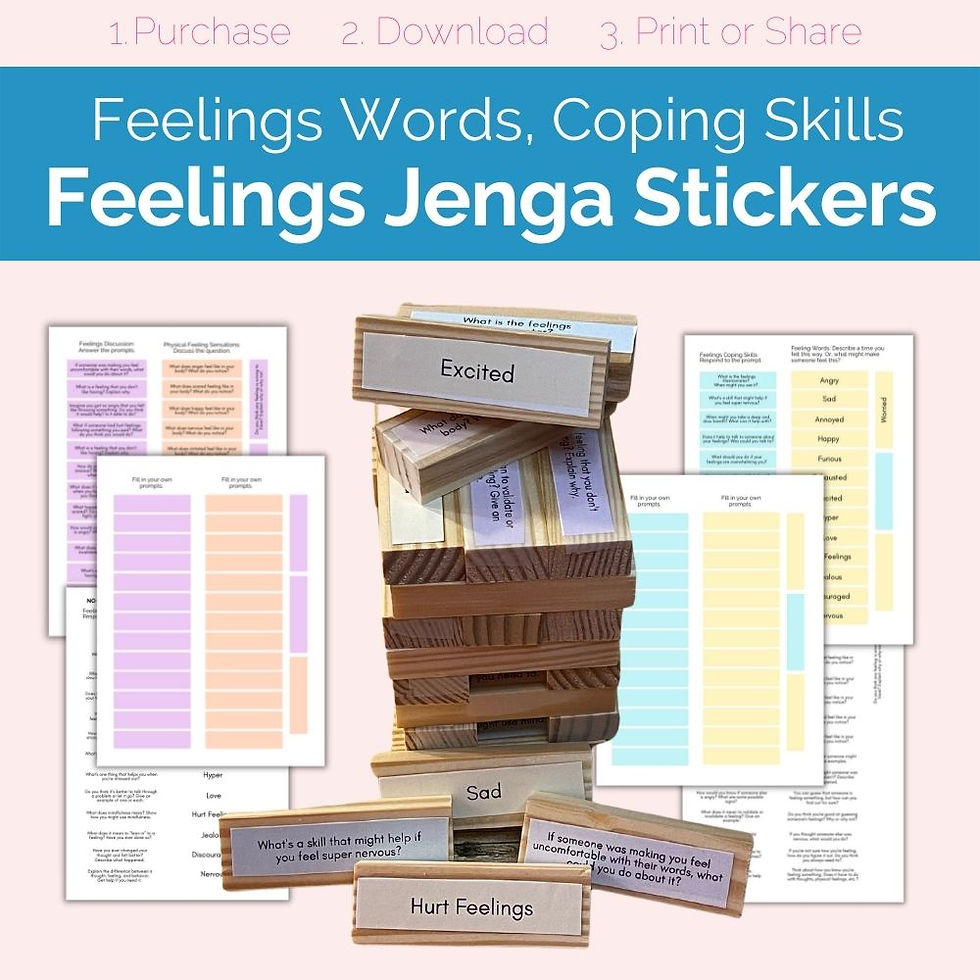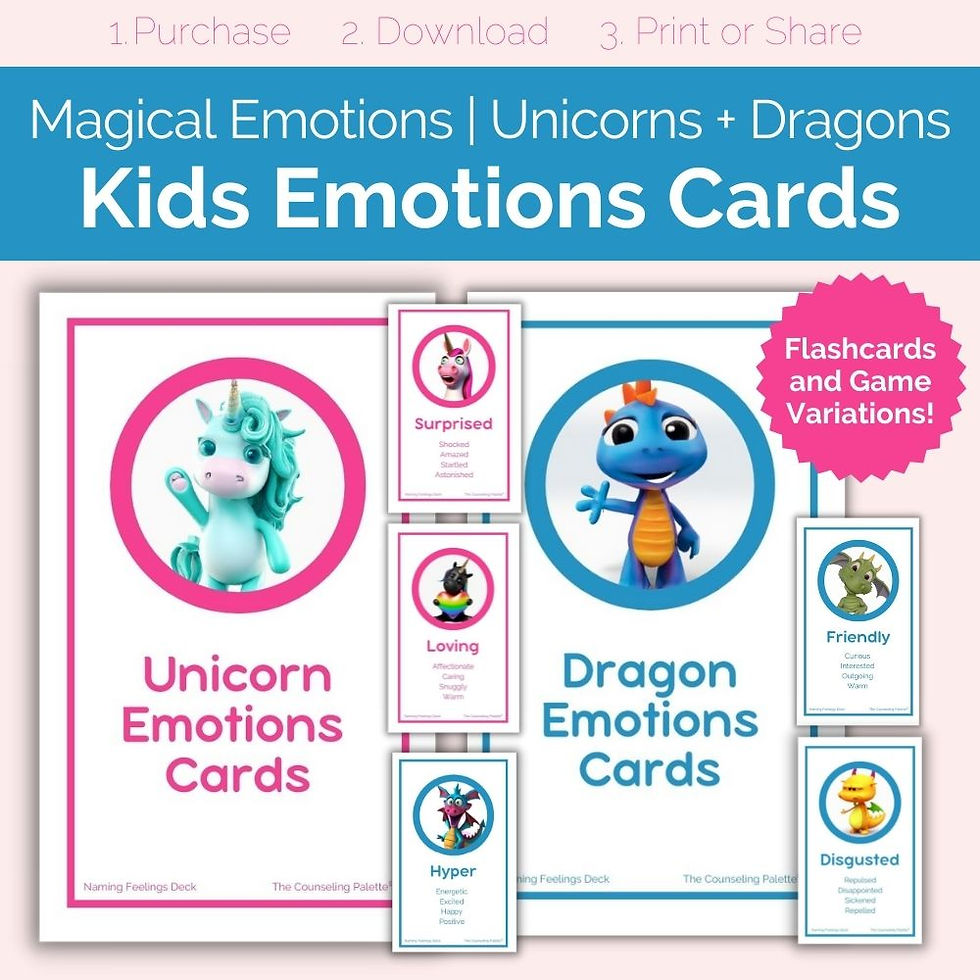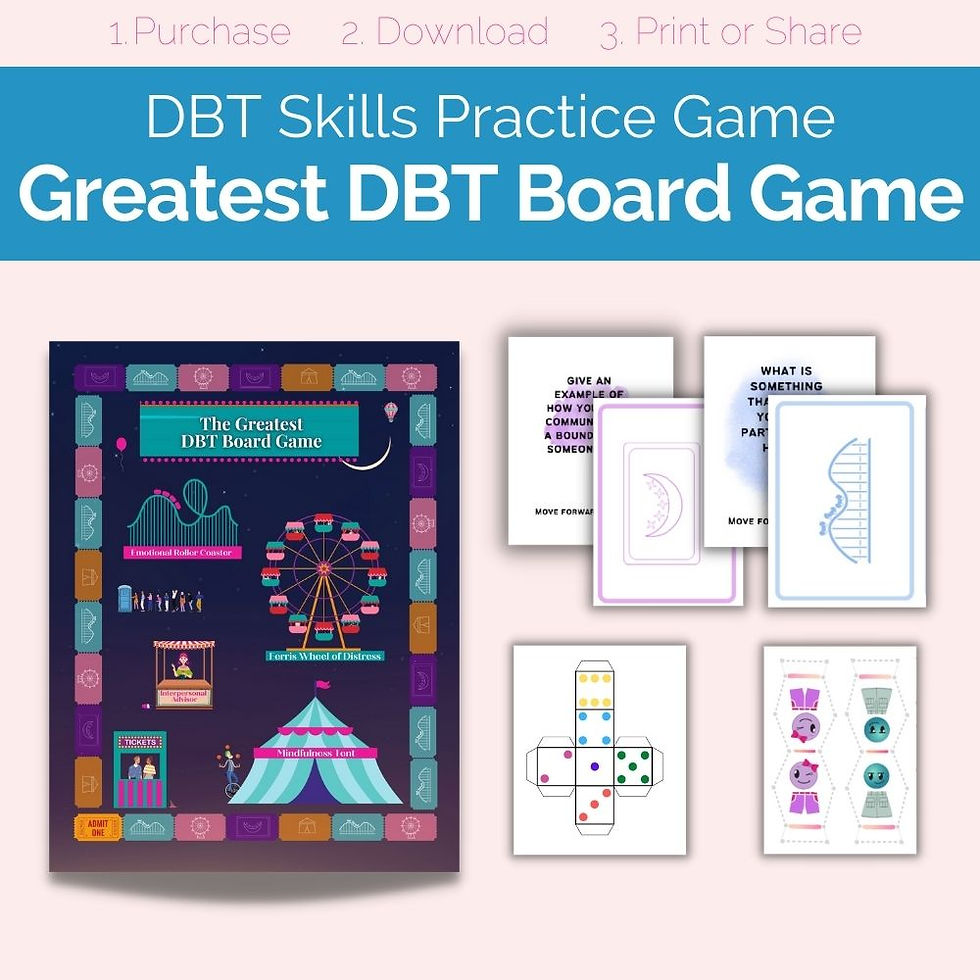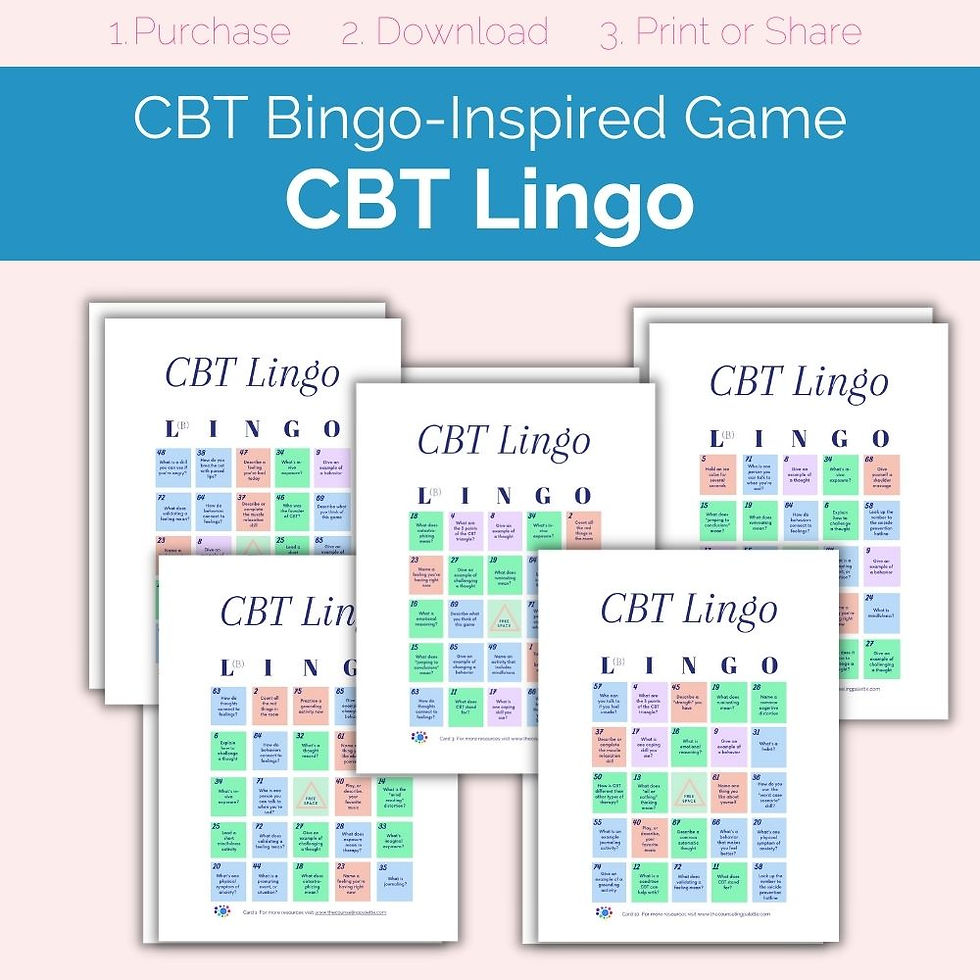Find the SEL activities best for your students, groups, and classrooms.

Mentor, parental figure, friend, organizer, volunteer, therapist ... what are teachers not expected to be!? No one can do it all, and especially not alone. Learning social emotional skills is an important part of growing up, but teaching it within a sea of other subjects and duties can be overwhelming.
Fortunately, there are many fun social and emotional learning activities that can help. These tools aren't just like any other game that encourages cooperation--they have social emotional skills lessons built right in. Here are some SEL games and other activities to check out. Most of these are in PDF format so you can download them anytime.
SEL Activity Highlights
1. FEELOPOLY
FEELOPOLY is a popular cooperative game among kids and therapists, and works great for one-on-one and small group setting. It's focused on naming feelings, discussing emotions, and learning to show empathy for yourself and others.
It covers self-awareness, social awareness, and other areas recommended by CASEL. Activities in the game include:
Labeling emotions
Recognizing feelings in the body (ie, feeling shaky when you're nervous)
Validating and accepting emotions in yourself and others
Using coping skills relating to emotions
2. FEELOPOLY for Zoom and Large Groups
This version of FEELOPOLY is best for platforms like Zoom, as well as for large classrooms, because you can project the game and you don't have to gather around a game board.
The game is similar to the traditional FEELOPOLY game, however the board is reimagined as a projection, so players can get the feel of a real board game.
Discuss feelings, work together, and validate emotions as a classroom as you practice valuable SEL ideas! The projection version of FEELOPOLY is currently in beta and you can download it along with the traditional game product. Visit here to learn more.
3. Feelings Jenga
Feelings Jenga is another popular game among therapists that's been around for years. Many counselors create their own versions, using prompts, color-coded emotions, and much more.
In this version f Jenga, each block represents a prompt. It might involve discussing an emotion, or answering an icebreaker question.
This particular set of Feelings Jenga Stickers is set up for you, so you can apply the prompts directly to your blocks. It works best for small group settings and one-on-one or family groups. Check it out here!
4. Feel, Act, & Draw
Feel, Act, & Draw is a game that combines elements of Pictionary and Charades. It's highly active, so use it wisely. It can be a game to match the high activity needs of a hyperactive group. Or, it might be a way to draw quieter students out.
It's easy to pull out the prompts or dd new ones based on your needs and goals for the game.
5. Happy Dragon
Happy Dragon is based on "Old-Maid," except the goal is to be holding the special card (Happy Dragon) at the end.
You can play the game as is, or discuss the feelings as they match up. The Happy Dragon game is part of a larger set with other games and general feelings cards (described more below). Visit here to download it and play today.
6. Go Feel!
Go Feel! is based on Go Fish. Players ask for certain feelings (or you can use the images) to create sets. If you'd like to add more to the game, you can facilitate a discussion for each feeling that is matched.
Ask open-ended questions, such as "Have you ever felt this way?" or "What's it like to have this feeling?"
Donwnload Go Feel as part of other magical-themed feelings decks. Visit here to learn more.
7. Emotions Match
The Emotions Match game is exactly as it sounds -- a feelings match game. However, instead of matching up the same images, you match up the feeling words with the matching expression and body language of the unicorn and dragon characters.
The game is a subtle way to teach feeling words, empathy, and self-awareness. Like with Go Feel! you can also use each match as a way to talk about emotions if you want to take the game further. You can download Emotions Match with the overall Magical Emotions Card deck (seen below). Visit here to check it out.
8. Feelings Cards
The kids emotions deck, or feelings cards, are a great way to help kids get familiar with feelings in a fun and non-threatening way. It includes separate unicorn and dragon decks, or you can mix and match (each set has different feeling words).
As mentioned, this set also includes all of the feelings games above, with variations of the decks suited for each game. There are even cards to add your own feelings!
Since the feelings deck comes as a PDF, you can also download or print multiple versions for your clients, students, or classrooms! Downloads the deck here.
9. Coping Skills Cards for Kids
This set of coping skills for kids cards is compatible with the feelings cards above. It includes a mix of the dragons and unicorns theme.
Since the cards are in PDF format you can download and print multiple cards, or keep a few decks on hand for the classroom.
They're great for calm-down corners, reviewing coping skills, and teaching self management and responsible decision-making.
Download your copy of the deck here. They're kid-approved!
10. Kids Anger Management Worksheets
It can be frustrating when a child gets angry or has inappropriate behaviors. Sometimes they haven't had a chance to learn about feelings, coping, or self-soothing, and that can make all the difference.
This set of worksheets starts out with the popular metaphor of the anger iceberg. The "angry iceberg," in this case, shows a lot of anger on the surface. But often underneath there are feelings like confusion and fear fueling those expressions.
The worksheets walk through understanding anger, recognizing triggers (through the Exploding Volcano) and using self-soothing skills (at Mindful Mountain). These worksheets are created to build on each other, although they can also work as standalone lessons. Download them here.
11. Printable Therapy Dice
Therapy Dice is a fun and easy way to gamify learning SEL skills. This set may be best for older kids and teens.
It includes feelings dice, as well as skills and terms from cognitive behavioral therapy (CBT) and dialectical behavioral therapy (DBT).
If you or your school or program use CBT or DBT it can be a great addition to your toolkit. The dice also include some basic feelings prompts for discussing emotions in general. Visit here to shop therapy dice!
12. Flip Books
Flip books can help kids create a coping plan for various experiences. For example, they might draw a feeling one one side and a coping skill on the other. Try using index cards, then hole punch the corners and attach them on a ring or ribbon.15.
13. Guess the Feeling PBS Game
Guess the Feeling is a Daniel Tiger game by PBS. The game features facial expressions, and the bright colors are attractive for younger kids. Check it out here.
14. Feelings Masks
Feelings masks are a great activity for all ages. You can create your own variations. For younger kids you may simply use a circle drawn on a piece of paper, or a paper plate. Kids can choose any emotion from a list and draw it on the mask.
Or, they can create a feel-good emotion on one side and an uncomfortable feeling on the other side. Teach the idea that all kinds of feelings are normal, even when they don't feel good sometimes. They can either feel the feeling until it goes away, or use a skill to feel better.
16. What are They Feeling? Game
This feelings match game is appropriate for teens and young adults, and it's kind of fun. Look at historical images and drawings and guess the matching emotion. It's a quick activity but can be a good discussion opener for adolescents. Check it out here.
17. How are You Feeling? Game
On the other end of the spectrum, the How are you Feeling? game is best for kids 6 and under. It introduces children to emotional awareness. Learn more here.
18. Calm Down Jars
Calming jars are a favorite among kids. I like to use fancy bottles like those that come with premium water from the gas station. But any clear bottle or jar will do. Kids can choose small toys and trinkets to fill up the jar, along with glitter or plastic confetti.
Fill the jar with water and secure with superglue or another strong adhesive. Kids can use the jars when they need to self-soothe. I recommend limited access to the jars so they don't just become another everyday toy or activity. For example, perhaps they can use the jar in a certain area, or they can only use it when they're not doing another activity.
19. Ready for Preschool: Feelings
Working with very young children on SEL skills? This Disney game Ready For Preschool: Feelings is for kids 6 and under. It features cute and fun baby animals. Visit it here.
20. Emotional Roller Coaster
Check out the Emotional Roller Coaster, a coping skills and anger management game for kids. It includes a fun game board and discussion prompts. Learn more here.
21. Stress Balls
Stress balls are a tried and true feelings activity. Not only do they provide an actual skill, but they're validating since you're sending the message that you know being a kid is stressful too. They may work particularly well for adolescents. You can easily make your own by packing balloons with flower, or there are many versions online such as these.
22. Weighted Stuffed Animals
Wish you could have a dog in your classroom that was well-behaved and never made a mess? Weighted stuffed animals are great comfort items and can be a special treat or a good calming activity for big feelings. There are versions now in multiple price ranges. The more expensive ones like these are so real-feeling I find them a bit creepy.
23. Sensory Bean Bags
Emoji bean bags are another hands-on option and can be great for tactical learners. They can also serve as their own little regulating tools. You can make your own or check out online versions like these.
24. Mad Dragon
Need help with anger-management for older kids? Mad Dragon is an educational game for children 6 to 12. It focuses on recognizing and regulating anger and other strong emotions. Check it out here.
26. No Waries
No Waries is an easy card game that teaches emotional vocabulary. High card wins, but the player must use the feeling word in a sentence. Check it out here.
27. Journaling
Journaling is a great activity for older kids and teens to express and work through emotions. Start with easy prompts such as "Write about something that happened to you today." Kids can then work into journaling about their deeper feelings and experiences.
28. Color-Emotion Matching
Making complicated feelings tangible can be a cathartic activity for kids. Have them list 5 to 10 feelings (or give the feelings to them) and then choose a color to represent each feeling. They can then scribble, draw emojis, or color feelings pages with various colors.
The most important part of social emotional learning may just be that it sends the message that emotions are real and that you don't have to cope with them alone. Practice teaching support and affirmation, no matter what a student or client is feeling or going through.
To download a complete kit covering many areas of SEL and other therapeutic activities, check out our Entire Store Bundle. Download it here.
31. CBT Triangle

The CBT Triangle is a good foundational activity for teens and young adults. Cognitive behavioral therapy (CBT) teaches that feelings and behaviors connect to our thoughts.
This triangle worksheet walks through that process and includes hands-on instructions to practice with specific thoughts. Download it here.
The following activities build on CBT skills as well as related skills from dialectical behavioral therapy (DBT). They work best if you have some foundational understanding and training in CBT and/or DBT.
32. CBT Island Quest
CBT Island Quest is based on CBT techniques. It includes prompts about recognizing and changing harmful thoughts in order to feel better.
Some questions also include more technical topics, but you can remove those if they're not appropriate for your group. The mechanics of the game are very simple, so the game engine runs itself smoothly. Encourage conversations, or even split your classroom into multiple groups and check in to help. Learn more here.
33. The Greatest DBT Board Game
If you run DBT groups for students or other clients, this is a great way to review skills. The Greatest DBT Board Game features the emotional roller coaster, Ferris wheel of distress, and the mindfulness tent.
It covers the basic DBT categories, including emotional regulation, distress tolerance, mindfulness, and interpersonal skills. Prompts cover many skills, such as opposite action, DEARMAN, and Wise Mind. See more about the DBT game here.
34. CBT Lingo
CBT Lingo is a Bingo-like game that's a great supplement to a CBT class or therapy. It includes some technical questions such as describing the difference between a feeling and behavior, or more simple prompts such as "Name a feeling you're having,"
The game covers mindfulness, feelings, thought, and behaviors. Check out CBT Lingo here.
35. CBTiger
CBTiger covers emotional awareness, coping skills, and social skills. The colorful card include cute, emotional animals. Game players answer prompts and discuss how they might handle various situations. Visit CBTiger here.
15. TF-CBT Triangle of Life
The TF-CBT Triangle of Life app is a good option for school counselors and others trained in cognitive behavioral therapy (CBt). game helps kids individually identify thoughts, feelings, and behaviors. It's built to support trauma-focused CBT therapy with children, but is appropriate for any child learning CBT in therapy. Lean more here or look it up on your device.
30. Don't Go Bananas
The Don't Go Bananas game uses CBT techniques to help with overwhelming emotions. It helps you teach cognitive distortions and how to challenge them. Get more details here.
25. Mixed Emotions Game
The Mixed Emotions game also uses a CBT-perspective. The game includes a colorful board, playing prompt cards, and prompts to work on expressing feelings. Check it out here.
36. Stop, Relax, and Think
The Stop, Relax and Think game helps teach problem-solving skills and encourages effective way . It includes a fun board game and a kid-friendly theme. You can buy the game here on Amazon.
Looking for a way to make SEL fun? Games and other fun activities are a great way to do it. Check out our individual products or convenient packages. Learn more here.
*Games listed from Amazon will return a small commission if you purchase through our links.
-Jennie Lannette Bedsworth, MSW, LCSW, is a licensed clinical social worker with 20+ years of experience in therapy and social services. She specializes in CBT therapies for trauma and anxiety.

















































































